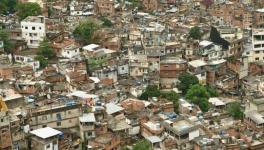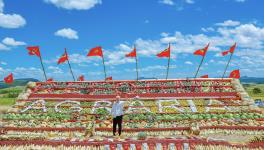Summer 2016 Olympic Games in Rio Eclipsed By Controversy
On Friday, August 5, Rio de Janeiro will be hosting 2016 Summer Olympic games. These Olympics have been mired with controversy. Tens of thousands of Brazilians recently protested against them because of an enormous cost and the amount of displacement the construction for the Olympics have caused. It is said that up to 77,000 people have been displaced from their homes because of the construction. Also, there has been some concern that venues might not be completed in time. At the same time, this will be one of the largest Olympics in history, with over 10,000 athletes participating, and over 85,000 security forces protecting them from terrorist attacks, double the number of the London Summer Olympics in 2012. Dave Zirin discusses the politics and the controversy surrounding the Rio Olympics.
SHARMINI PERIES, EXEC. PRODUCER, TRNN: Welcome to the Real News Network. I'm Sharmini Peries coming to you from Baltimore.
On Friday, August 5, Rio de Janeiro will be hosting 2016 Summer Olympic games. These Olympics have been mired with controversy. Tens of thousands of Brazilians recently protested against them because of an enormous cost and the amount of displacement the construction for the Olympics have caused. It is said that up to 77,000 people have been displaced from their homes because of the construction. Also, there has been some concern that venues might not be completed in time. At the same time, this will be one of the largest Olympics in history, with over 10,000 athletes participating, and over 85,000 security forces protecting them from terrorist attacks, double the number of the London Summer Olympics in 2012.
With us to discuss the politics and the controversy surrounding the Rio Olympics is Dave Zirin. Dave recently released a second edition of his book, Brazil's Dance With the Devil: The World Cup, the Olympics, and the Fight for Democracy. He's also a columnist for the Nation magazine. Thank you so much for joining us, Dave.
DAVE ZIRIN: It's great to be here, thanks for having me.
PERIES: Before we go into the actual Olympics, Dave, let's talk about the politics in Brazil. As most people know, there has been an impeachment process underway, and President Dilma Rousseff is, of course, suspended, awaiting the decision of a Senate committee that's processing her impeachment. And now, on Friday, charges had been laid against former president Lula, as he's been indicted for obstruction of justice. So what's going on on the political front?
ZIRIN: Yeah, I mean, what's going on is that this is no coincidence. I mean, the timings of both the attacks on Dilma, the impeachment of Dilma, and this indictment of Lula are all very interestingly timed around the Olympic games, when the attention of the world is on Brazil. This is about a message being sent, I believe, to foreign investors, to international commodities markets, that investing in Brazil is, in fact, a good investment. Brazil is currently mired in its worst economic crisis in decades. I mean, some say in the history of the country. And this is all happening in the wake of unprecedented economic growth under Lula, and then Dilma as well.
And this has so clearly been timed around the crisis, around thinking that they could get international cash flows and investment back into the country, if they show that they could bring the Worker's Party to heel. And what's so ironic about this is that the very laws that Lula is being prosecuted under are laws that he himself signed into the legislative history of the country for the purposes of fighting corruption which has long plagued Brazil's politics. I mean, it's just very difficult to take any of this stuff seriously or look at it objectively, given how widespread we know corruption to be in Brazil and how it crosses all political parties.
PERIES: Now, David, this particular Olympics has got a whole lot of controversies piling up on top of each other. I mean, there are the issues of the demonstrations that are going on. Pro-Rousseff, anti-Temer. What kind of, what numbers are showing up, and how significant are they?
ZIRIN: The protests themselves, I mean, are actually much smaller than they've been in recent years. For example, in 2013, before the Confederations Cup, these anti-World Cup protests that took place around the country were significantly larger than the ones that we're currently seeing, largely because there's a great deal of demoralization in the country. I mean, there is no politician right now in Brazil who holds any kind of standing.
And that's what's so cynical about this attack on the Worker's Party, is that what it's done is it's driven--and make no mistake about it, I think the Worker's Party set themselves up for this in many, many different kinds of ways that we can talk about if you like, including letting enemies of their program into their own cabinet as a way to showcase a kind of national unity. Those very enemies who later testified against them and stabbed them in the back. But what it's done is it's driven a stake in the heart of the idea that democratic popular participation leads to change.
So my last trip there, I was really struck by two things. My last trip there was just in May. I was struck by both the protests that I did go to, how they were not connected to any formal political party, which is different than Brazil's history, and really the whole region's history. And I was also struck by the level of cynicism by people who were former activists. Who just felt generally disgusted, betrayed, cynical about the whole thing.
PERIES: And if they were not affiliated with any of the parties, what were the protests about?
ZIRIN: It's very interesting because you know, there's the old saying that nature abhors a vacuum. And in this case, the vacuum has been provided by people's demoralization with the Worker's Party and with class-based union politics, which have always dominated Brazil's left. So what I saw a lot more of were really protests that seemed very influenced by the Black Lives Matter movement in the United States.
Brazil, even though it's very similar to the United States in terms of its history of racism, police brutality, slavery, and all the rest of it, there's never really been a mass black freedom struggle in Brazil, or race being the leading edge for how people talked about politics and fought oppression. And there's a great deal more of that right now in Brazil. And not because of any sort of particular book or text or argument or anything like that, but really much more because the level of police killings in Rio, in particular, has reached levels that are so obscene that I don't think people in the United States can really comprehend them. Like, one out of five murders that took place in Rio last year were police officers killing people. One out of five. And overwhelmingly, the victims of these murders are young and black.
So these protests have developed in that way. And while in the past, while these sorts of police murders, extrajudicial killings, took place, it was the union movement that was out front fighting them, that union movement right now is demoralized, split, and all the rest of it, because of the problems in the Worker's Party. So it's been--there's just been a lot of different kinds of organizing happening on the ground. I wonder how much of what we're talking about is going to make it into NBC's Olympic coverage. Probably not too much.
PERIES: Probably not too much.
ZIRIN: But that's the kind of dynamics that I'm seeing there. I could also say, too--I really, really hate to make everything about Donald Trump, but I read this analysis about Trump that said that one of his points of genius was that he says and does so many outrageous things that it's like lying on a bed of nails. Like if everything is sharp than nothing has the same impact that it would from somebody else. And I thought, that's a lot like what's happening with the Olympics in Brazil. It's like there are so many problems that range from the horrifying to the ridiculous that it's almost like if everything is a problem, then how do you really focus on the one thing that's the most important?
So I mean, I find myself writing about things like skydivers who are trying to do Olympic stunts, and their parachutes don't come out, or get tangled up, and they fall to their deaths. Or the police killed the Olympic mascot, Juma the Jaguar, because they didn't sedate it properly. And you get those stories that are mixed in with, oh, by the way, there aren't enough resources going into public health in the midst of the explosion of the Zika virus, because they have to pay their Olympic bills.
PERIES: Now, speaking of the Zika virus, there's a lot of issues surrounding this particular Olympics. The Zika virus, the construction, the stadiums not being completed--.
ZIRIN: It's a bed of nails. That's what I'm saying.
PERIES: So give us a sense of the magnitude of the issues that this set of Olympics are dealing with, and then is this unusual?
ZIRIN: That's, the second part of your question, I think, is the most important question that's not being asked, in certainly the U.S. media. And there is such a temptation--maybe it's laziness, maybe it's corruption of corporate media. I'm not even quite sure what the diagnosis is. But there's this temptation to say the problem is Brazil, that Brazil is a dysfunctional society, that Rio is dysfunctional. And it's not to say that there's not truth to that. But when we look at it through that lens, what we often do is we let the International Olympic Committee off the hook. And we don't recognize that the problems that we're really talking about emerge.
Forget about the individual crazy stories of jaguars and the rest of it, and you focus on the fact that the main issues are debt displacement and the militarization of public space, well, that's something that affects every country. And I was, for example, just annoyed that members of, like, the Greek Olympic committee, they put out this statement condemning the conditions in Rio, as if we're not supposed to remember what conditions were like in Athens in 2004. As if that never happened. And as if the former Olympic structures in Athens now aren't being used as squatter settlements for homeless people.
So when we focus on Rio specifically, I think we lose sight of the much broader issues that are taking place.
Now, that's not to say there aren't things that are specific to Rio, though, as well.
PERIES: Exactly. You know, I opened by saying how many thousands of security personnel are actually being, are in Rio. Give us a sense of how serious that problem is, and are they expecting terrorist attacks on the Olympics?
ZIRIN: Well, it's interesting, because they certainly are vulnerable. I mean, that's what's I think very scary about it. Is if one was of a mind to do some sort of attack from any political persuasion, this would be, and make an international splash, it's tragic to say this, but this would be the Olympics to do it, because the security situation is kind of a mess. There's no real sense that anybody knows what they're doing. So they're trying to substitute for the fact that they really, you know, Brazil has largely been terror-free despite all the crises in recent decades. So what they're basically depending--they have no real experience or expertise on how to do this.
So what they're focusing on instead is just flooding the streets of Rio with officers and police. You mentioned it coming in, 85,000. I mean, that's actually going to end up being more than, according to the latest reports, maybe even more than 85,000. Keep in mind that 85,000 is twice as many as were in the streets of London in 2012. And it's roughly half the number of U.S. troops in the entire country of Iraq, at the height of Bush's war there. And this is just in one city, for one Olympics.
And so I think they are hoping that a show of force--.
PERIES: And to protect 10,000 athletes and spectators.
ZIRIN: Exactly. And what--so they're hoping, I think, the show of force does the trick. The thing about it, though, that's so upsetting, is that for people who know the history of police violence in Rio in particular, who's really going to be the people most likely who get hurt by this incredible ramping up of the security state in Rio? It's most likely going to be the poorest people, the people that they're going to try to make sure stay on lockdown so there aren't stories of, you know, of robberies, of kidnappings, of all the rest of it. And they will collect--I mean, it's so sad that we know this the way that the sun will rise in the East. But there will be a body count in poor communities in Rio as the result of this level of police engagement with the city.
PERIES: Dave, we look forward to hearing from you when you get down to Rio, and I wish you all the best.
ZIRIN: Thank you so much. And thank you for everything you guys do at the Real News Network.
PERIES: And thank you for joining us on the Real News Network.
Image courtesy: theintercept.com
Get the latest reports & analysis with people's perspective on Protests, movements & deep analytical videos, discussions of the current affairs in your Telegram app. Subscribe to NewsClick's Telegram channel & get Real-Time updates on stories, as they get published on our website.
























